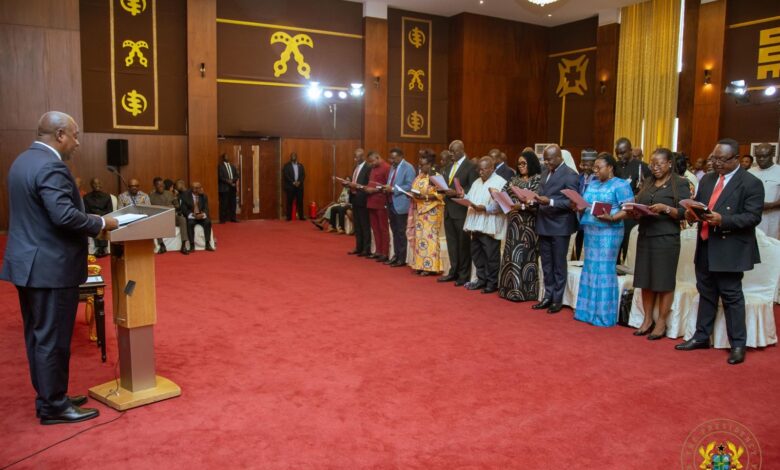
Accra, Ghana – President John Dramani Mahama has officially inaugurated the 37-member Eighth National Development Planning Commission (NDPC), charging them with a historic responsibility to chart a long-term, non-partisan development strategy that will steer Ghana’s progress for generations to come.
At the inauguration ceremony, President Mahama called on the Commission to craft a “bold and transformative path” that empowers the nation to break free from the limitations of the past and build a resilient, inclusive, and prosperous future.
He emphasized that the plan must transcend electoral cycles and short-term political interests, instead laying the foundation for sustained national development that serves all Ghanaians, regardless of who is in power.
The NDPC, established under the 1992 Constitution and guided by Acts 479 and 480, is mandated to prepare national development policies and strategies, monitor and evaluate government programs, and advise both the President and Parliament on development planning.
President Mahama underscored the importance of broad, inclusive consultation in fulfilling this mandate, urging the Commission to engage Ghanaians from all walks of life in shaping the country’s development direction.
He further highlighted the NDPC’s vital role in formulating the Coordinated Programme of Economic and Social Development Policies, which he is constitutionally required to present to Parliament within two years of assuming office.
This coordinated programme, he noted, will serve as the foundation for the Medium-Term National Development Policy Framework, ensuring that Ghana’s development agenda remains cohesive and consistent.
Read President Mahama’s Full Speech below 
Honourable Chief of Staff, senior members of the Presidency, our General Secretary, our Chairman of the NDC, Distinguished Commissioners of the National Development Planning Commission, invited guests, members of the media, ladies and gentlemen.
It is a great honour for me to inaugurate and swear in the 8th National Development Planning Commission members. Established under Articles 86, 87 of the 1992 Constitution, the Commission’s mandate was further reinforced by Act 479 of 1994.
These provisions empower the Commission to prepare national development plans, monitor and evaluate the performance of government programs and provide informed advice to the President and Parliament through rigorous research and policy analysis. This is a significant mandate that demands broad consultation and active engagement with citizens across all sectors of society.
Over the years, the Commission has upheld this responsibility and I trust that under your leadership it will continue to do so with renewed diligence, integrity and commitment.
Article 36.5 of the Constitution enjoins the President to present a coordinated program of economic and social development policies to Parliament within two years of assuming office. Since 1994, this task has been carried out in close collaboration with the Commission. And I’m pleased to note that preparations are underway for my administration’s next coordinated program.
My office stands ready to support this important process as the program will reflect not only the vision and policy priorities of this government but also the collective aspirations of the Ghanaian people.
This coordinated program will also be the foundation for the following medium-term National Development Policy Framework as has been the practice. This framework will guide the operations of ministries, departments, agencies and metropolitan, municipal and district assemblies over the next four years.
Distinguished ladies and gentlemen, permit me to briefly address an issue of growing national interest and that is the urgent call for a long-term national development plan. Ghanaians increasingly demand a stable and predictable path for national development that transcends our electoral cycles and partisan politics.
Here I’m reminded of the words of Osagyefo Dr Kwame Nkrumah in his visionary seven-year development plan and he stated, the economic policies will lack direction and consistency unless they are firmly related to a clear vision of the structure of the economy towards which we are moving.
It is only in the longer view, he said longer view, that it is rational to project any really radical transformation of our economic system. And he goes on to say, in the very short period we remain prisoners of our past. And so there already Nkrumah was projecting that we should have a longer view of our path of development.
Indeed nearly 70 years after independence, our economy continues to rely heavily on a narrow range of primary commodities with limited diversification and value addition. This reality reflects the persistence of structural constraints that continue to hold us back. Proof that in many respects we remain, as Nkrumah said, prisoners of our past.
Since the completion of the 40-year national development plan in 2017, under the leadership of Dr Nii Moi Thompson, who now returns to chair the commission, other frameworks with similar long-term ambitions have emerged.
Notable among these are the Ghana Beyond Aid Charter, the Ghana at 100 Long-Term Development Framework, and the Vision 2057 Perspective Framework. I urge the commission to consolidate all these various efforts into a coherent, inclusive, and forward-looking national development plan.
This must be done in close collaboration and consultation with parliaments and the people’s representatives to ensure that the final plan reflects a broad national consensus and is subject to regular review in response to evolving domestic and global challenges.
The task before you is immense, but I’m confident in your collective expertise, experience, and commitment. Let us work together to deliver a development plan that charts a bold and transformative path for our dear nation, Ghana, and one that will guide future generations and liberate us from the limitations of our past.
I congratulate you on your appointments, and I wish you success in your work ahead, and may your work be fruitful to guide Ghana into a future of immeasurable possibilities. I thank you, and may God bless our homeland, Ghana.
Story by: Emmanuel Romeo Tetteh(#RomeoWrites





